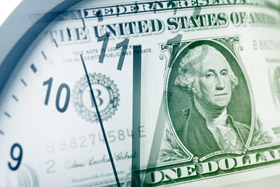FREEMANSPERSPECTIVE

I was recently asked to sit on an expert panel, analyzing an inflation/deflation debate between Harry Dent and Peter Schiff. Sitting with me on the panel were Doug Casey, Chris Mayer, and Karim Rahemtulla, as well as Messrs Dent and Schiff.
All of these guys spend prodigious amounts of time on financial analysis, and I don’t, so I wondered what I could bring to the party.
As I ran the subject through my mind, however, I realized something important had been left out of the analysis – something that I added to the panel and which I’d like to explain here. It was…
The Black Box
Without question, the central player in US markets (even world markets) is the Federal Reserve Bank. Every serious financial analysis concerns itself with Ben Bernanke and his successor Janet Yellen; indeed they have to, as the Federal Reserve single-handedly holds up the US stock and housing markets.
But when we talk about the Federal Reserve (or “the Fed,” for short), we are overlooking something very important:
Bernanke and Yellen are mere employees of the Federal Reserve, not the owners. And we don’t know who the owners are.
If you’re new to this subject, that may sound ridiculous, and I can’t blame you for thinking so. But, the fact is, we really don’t know. The US government doesn’t own it and isn’t telling who does.
We do know that the Fed is a private banking group that has been given a monopoly on the creation of US currency, and the list of its owners is a closely held secret.
The true owners are almost certainly reflected in the roster of Primary Dealers who skim from US dollars (actually Federal Reserve Notes) as they are being made, but we really don’t know much more than that. There was a list that circulated in about 1930, but that was a long time ago.
So…
Who are the people that Bernanke and Yellen take orders from? We don’t know.
What do these people want? We don’t know.
What are their long-term asset positions? We don’t know.
Who might they protect, aside from themselves? We don’t know.
If things get rough, will they obey politicians? Probably not, but we don’t know.
Our closest view of these people came from Professor Carroll Quigley, who said that he was given access to their records in the early 1960s. This is what he wrote in his book, Tragedy & Hope:
It must not be felt that the heads of the world’s chief central banks were themselves substantive powers in world finance. They were not. Rather they were the technicians and agents of the dominant investment bankers of their own countries, who had raised them up, and who were perfectly capable of throwing them down. The substantive financial powers of the world were in the hands of these investment bankers who remained largely behind the scenes in their own unincorporated private banks. These formed a system of international cooperation and national dominance which was more private, more powerful, and more secret than that of their agents in the central banks.
In another passage, he writes:
The powers of financial capitalism had another far-reaching aim, nothing less than to create a world system of financial control in private hands able to dominate the political system of each country and the economy of the world as a whole… Each central bank sought to dominate its government by its ability to control treasury loans, to manipulate foreign exchanges, to influence the level of economic activity in the country, and to influence co-operative politicians by subsequent rewards in the business world.
So, was Quigley telling the truth? I don’t really know, but Quigley maintained an excellent reputation. This wasn’t a man given to wild stories.
And if Quigley did tell the truth in 1966, is it still true?
I don’t know that either, and that’s the point!
There’s a fundamental factor in our financial analysis that is completely unknown to us.
Presuming…
Okay, presuming that Quigley was telling the truth and that his information remains close to true… and presuming that when push comes to shove, the Fed will ignore politicians… it seems likely that the Fed (who is buying up the rights to lots of real estate at the moment) will pull the plug at some point.
The purpose of pulling the plug will be two-fold: To reset an untenable economic system and to consolidate their position in a deflation. (Deflation, with its flood of loan defaults, transfers assets from borrowers to lenders.)
After that, and with some friendly legislation, they can print with abandon (“$10,000 checks for everyone!”) and reset their system.
Presuming, of course, that the suckers (that’s you and me) keep obeying the rules of their rigged game.
So…
This was my contribution to the great inflation/deflation debate.
There is excellent financial analysis being done by bright, competent, and brave men and women. But we must also remember that a large black box sits in the center of our analysis, and we don’t know what’s happening inside of it.
The people who can see inside of that black box – and there are some, whose secrecy is protected at the highest levels – have a gigantic advantage over all other investors and analysts. And so long as the inside of that box cannot be seen, the insiders will maintain that advantage.
This doesn’t make financial analysis pointless, of course, but it does leave it with a large “unknown” factor.
Paul Rosenberg
[Editor’s Note: Paul Rosenberg is the outside-the-Matrix author of FreemansPerspective.com, a site dedicated to economic freedom, personal independence and privacy. He is also the author of The Great Calendar, a report that breaks down our complex world into an easy-to-understand model. Click here to get your free copy.]


